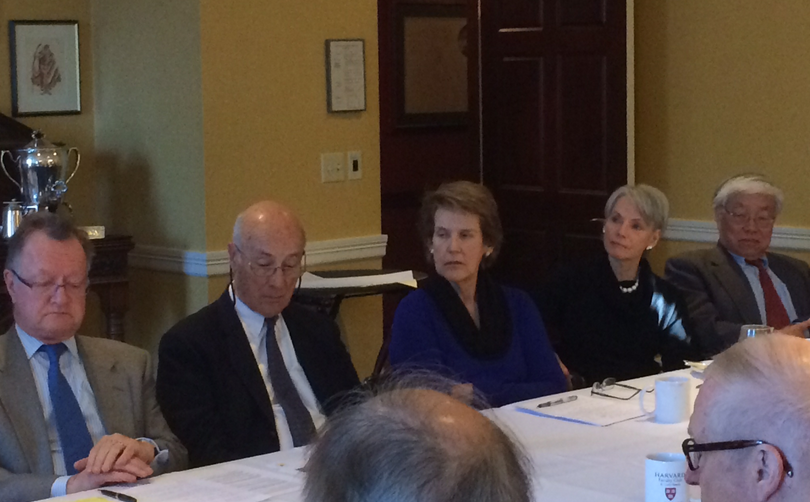(From Left to Right: Professor Ezra Vogel, Governor Michael Dukakis, Professor John Quelch)
(BGF) – On April 24, 2014 Boston Global Forum (BGF) held a successful online, international conference addressing the conflict between Japan and China, how to resolve the conflict, and the role of the U.S. in easing those tensions. The conference featured contributions from a number of notable speakers and discussants including: Professor Joseph Nye; Professor Ezra Vogel; Governor Michael Dukakis; former Australian Prime Minister Kevin Rudd; Ambassador Sir David Warren; Professor Kosaku Dairokuno; Professor Shigeto Sonoda; Dr. Hei Seki; Professor Suzanne Ogden; and former Ambassador J.D. Bindenagel, among many others.
The opening comments were provided by Professor Ezra Vogel, the Henry Ford II Professor of the Social Sciences Emeritus at Harvard University and renowned biographer of Deng Xiaoping, and Professor Joseph Nye, University Distinguished Service Professor at Harvard University, the former Dean of the Kennedy School of Government, and a member of BGF’s Board of Thinkers. The comments provided by Professor Vogel and Professor Nye laid the foundation for the productive discussion and sought to ground the discussion in a historical understanding of the relations between Japan, China, and the United States.
 (From Left to Right: Professor John Quelch, Professor Joseph Nye, Professor Suzanne Ogden, Former CNN Corespondent Jill Dougherty and Special Economic Adviser of Prime Minister Abe, Prof. Koichi Hamada)
(From Left to Right: Professor John Quelch, Professor Joseph Nye, Professor Suzanne Ogden, Former CNN Corespondent Jill Dougherty and Special Economic Adviser of Prime Minister Abe, Prof. Koichi Hamada)
The Root of the Conflict
In the early 1970s Japan and China normalized their relations. However, as Professor Vogel noted, the two countries left many issues unresolved. These unresolved issues, which include the current tensions over the Senkaku/Diaoyu Islands, have resurfaced in recent years and are now threatening Chinese-Japanese relations. As Prime Minister Rudd noted, the dispute over the Senkaku/Diaoyu Islands is a modern manifestation of a much older problem. With regard to the Islands, Prime Minister Rudd went on to note that “Of all the recent things we have seen in China-Japan relations, this one worries me the most”.
With that said, the historical foundation laid by Professor Vogel illustrated that relations between Japan and China have not always been so tense. In fact, in 1978 Chinese Leader Deng Xiaoping sought to continue to advance the normalization of Chinese-Japanese relations. In doing so Xiaoping became the first Chinese Leader to meet the Japanese Emperor and Xiaoping also visited numerous Japanese factories and steel plants. While Xiaoping wanted to build strong business ties with Japan, he wisely wanted to build a broader base for relations than merely business ties. Accordingly, Xiaoping opted to look towards the future of the two countries, rather than continue to argue over the past.
As a result of Xiaoping’s efforts, the Chinese public viewed Japan very positively during the 1980s. However, following the Tiananmen Square incident the Chinese Communist Party, which was worried about their public support, undertook an education initiative to create an atmosphere of patriotism. One of the most successful methods the Communist Party was able to utilize to create patriotism amongst the Chinese public was to bring up World War II and Japanese actions during the war. Ultimately, the references to World War II undermined the public’s positive perceptions of Japan and stoked a strong sense of nationalism amongst the Chinese public.
Although propaganda from the Chinese Communist Party undermined the positive perception of Japan amongst the Chinese public, the truth about China’s relationship with Japan is obviously more complicated. Given that the truth is more complicated, many of the participants in April 24th’s conference argued that there is reason for hope and that there are steps that can be taken to improve relations.
Firstly, China and Japan have significant ties through trade. As Professor Kosaku Dairokuno noted, there are over 22,000 Japanese companies operating in China. Moreover, China and Japan face a similar set of problems, such as rapidly aging populations. Thus, any escalation in the conflict over the Senkaku/Diaoyu Islands could hurt both countries economically.
Secondly, improved relations could occur through a more honest, transparent discussion of Japan’s role in China’s economic success. In particular, during the early 1990s Japan played a critical role in helping China get past international economic sanctions that were being imposed on it. Additionally, as noted above, Japan and China have strong economic ties and more in common than their leaders may be willing to admit.
Thirdly, in order to facilitate an honest discussion of the relationship between China and Japan, Professor Ogden suggested that China should create Japan institutes. This would lead the development of Japanese studies scholars and allow for a better understanding of how critical Japanese investment has been for Chinese economic development as well as better and more honest understanding of Japan and its culture.
Of course, an honest and transparent discussion of China’s relationship with Japan would mean that both countries need to stop reverting to nationalist sentiments and rhetoric. Abandoning nationalist rhetoric is crucial in easing the tensions between China and Japan. As Professor Vogel illustrated, nationalist sentiments were responsible for adversely impacting Chinese-Japanese relations in the 1990s. As Prime Minister Rudd noted, particularly in the case of the Senkaku/Diaoyu Islands: “That nationalism, that patriotism, is a potent and dangerous box for either side of this relationship to draw upon in terms of dealing with domestic political problems…in this case, it’s particularly dangerous.”
Finally, China and Japan should push the issue of sovereignty over the Senkaku/Diaoyu Islands to the back burner so that it can be resolved by future generations. Several of the discussants noted that it is unlikely that Japan and China will be able to resolve the sovereignty issue over the islands anytime soon. One possible suggestion for doing this would be to turn the islands, which are uninhabited, into a marine ecological preserve – this would prevent either country from inhabiting the islands or using them for military purposes.
(Former Prime Minister of Australia, Kevin Rudd and Special Economic Adviser to Japanese Prime Minister Abe, Prof. Koichi Hamada)
The Role of the U.S.
The Obama Administration’s current policy of “rebalancing” toward Asia has its roots in the Clinton Administration’s policy towards Japan and China and reflects the Administration’s feeling that it is critical to reestablish the U.S. presence in the region. Building on the wisdom of the Clinton Administration, the U.S. is critical to establishing stable relations between the U.S., China, and Japan.
During the 1990s the Clinton Administration made it clear that they would not attempt to contain China’s emergence internationally and that the U.S. had more to fear from a weak China than a strong China. Accordingly, the U.S. sought to extend a helping hand to integrate China into the international system. However, the U.S. hedged its bets by reaffirming its commitment to the U.S.-Japan security alliance.
Ultimately, according to Professor Nye, the U.S. policy has been, and should continue to be, about establishing: “A triangle of good relations between the United States and China, the United States and Japan, and China and Japan was the basis for stability in the region and that stability would produce more prosperity.”
As part of its efforts to promote a triangle of good relations, the U.S. should work to create a multilateral framework that will enable the U.S. to work with Japan and China to resolve the issues at the root of tensions between Japan and China and the U.S. and China.
While China’s relationship with Japan is increasingly tense, the U.S., particularly through the Obama Administration’s rebalancing towards Asia, can help these two countries find a peaceful, diplomatic resolution to the issues at the root of the tension. However, as the conference illustrated, there are a number of steps that Japan and China can each take to help ease tensions. At the core of the issue, it is essential for China and Japan to abandon their nationalist rhetoric in favor of a more realistic, honest appraisal of their relations. By recognizing the interconnected nature of their relations, the U.S., Japan, and China can work to address their common problems and find a way to mutually prosper, and Obama’s rebalancing toward Asia can play a crucial role.
The conference was then concluded by Professor Vogel, Professor Nye, and Governor Dukakis, who offered some final comments. Building off of the successful and lively discussion at the conference, BGF, under the leadership of Professor Nye and Governor Dukakis, will build up an initiative to resolve the conflict between China and Japan. As part of this effort, BGF will host two further conferences on this topic later this year – the second in September and the third in November.
(Professor John Quelch and Professor Joseph Nye)


